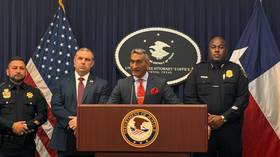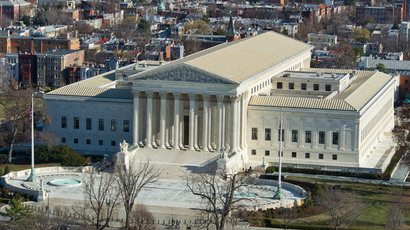US Supreme Court to rule on Jerusalem birthplace law

The US Supreme Court has agreed to hear a case regarding the validity of a law permitting American citizens born in Jerusalem to list Israel as the place of birth on their passports.
According to Associated Press, the high court will issue a definitive ruling on a law that two presidents – George W. Bush and Barack Obama – claimed would "impermissibly interfere" with the executive branch’s constitutional authority to outline international policy and recognize foreign governments.
In 2002, Congress passed a law that permitted the State Department to list Israel as the place of birth for Americans born in Jerusalem. When President Bush signed the bill into law, however, he made clear he viewed it as advisory, since a mandate would infringe on the president’s authority on foreign relations.
As a result, his administration – along with President Obama’s – declined to move forward with the suggestion. Since both Israelis and Palestinians claim the city as their own, the US has refused to recognize any country’s sovereignty over Jerusalem in the absence of a negotiated deal between the two parties.Current US policy is to list Jerusalem as a place of birth but to exclude the country name.
When young Menachem Zivotofsky – a US citizen – was born to Ari and Naomi Zivotofsky in Jerusalem in 2003, however, the married couple filed a lawsuit seeking to uphold their ability to list Israel as the child’s place of birth. A ruling could potentially affect the passports of the roughly 50,000 Americans who were born in Jerusalem.
Previously, lower courts struck down the lawsuit on the grounds that the issue was too political to be decided by the justice system, and therefore needed to be resolved solely by Congress and the executive branch.
The Supreme Court disagreed with those decisions in 2012, though, ruling 8-1 that the case was valid. After working its way through the lower courts again, the justices agreed on April 21 to hear the case.
"Resolution of [the] claim demands careful examination of the textual, structural, and historical evidence put forward by the parties regarding the nature of the statute and of the passport and recognition powers. This is what courts do. The political question doctrine poses no bar to judicial review of this case," Chief Justice John Roberts wrote back in 2012, according to Politico.
"Zivotofsky does not ask the courts to determine whether Jerusalem is the capital of Israel. He instead seeks to determine whether he may vindicate his statutory right...to choose to have Israel recorded on his passport as his place of birth," he added.
During oral hearings on the case, the attorney of the Zivotofskys, Nathan Lewin, argued that even though there is a dispute over Taiwan’s sovereignty, the State Department allows Americans born there to not list China on their passports.
In response to arguments supporting Congress’ law, Justice Antonin Scalia essentially suggested that if Congress and the executive branch both have influence over foreign policy, the best outcome would be simply to have to two branches come to a settlement on their own.
"I would let ... them conduct the usual interbranch hand wrestling that goes on all the time, which probably means that if Congress cares enough Congress will win, because ... it has an innumerable number of clubs with which to beat the executive," Scalia said, according to Politico. "Why don’t we just let them go at it?”
Justice Sonia Sotomayer, however, did not seem convinced by this line of thought.
"If we call this a political question and don't address the merits, the outcome is that the President is saying that he's entitled to ignore the Congress,” she said. “I don't know what kind of message that sends, but it's a little unsettling that a Court charged with enforcing the laws passed by Congress are basically saying we are not going to determine whether this law is constitutional or unconstitutional.”
Oral arguments on the case’s validity will be heard in the Supreme Court’s next term, which begins in October and ends in June 2015.














